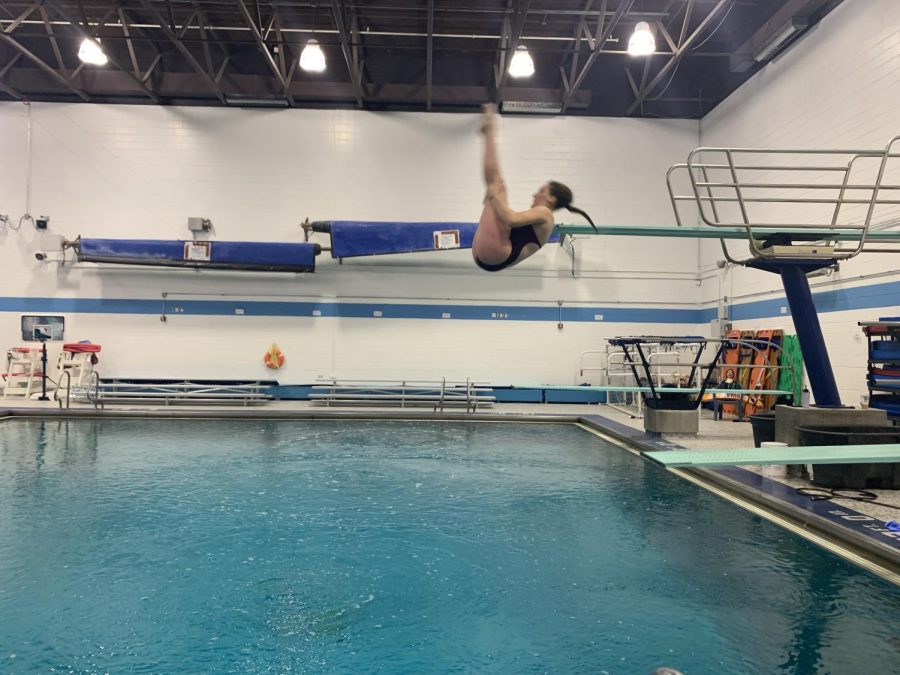Mindset of an athlete
To be the best at their craft, hard work and determination is a must- but how does an athlete do that? What may seem like a complicated question can be answered with a simple answer, their mindset.
One breath in and one breath out. Parson climbs to the top of the diving board and the room begins to go silent; and just for a moment, the world starts to slowly diminish around her and she’s left only with the pool underneath her and her mind to encourage her. One breath in and one breath out.
Athletes have a lot on their plates due to the expectations and pressures from their viewers, as well as their own desire to achieve personal excellence. To be the best at their craft, hard work and determination are a must, but how does an athlete do that? What may seem like a complicated question can be answered with a simple answer, their mindset.
Jacob Selig, a junior on the DGS varsity swim team, speaks on the importance of maintaining an optimistic mindset; to be the greatest of all time, you must have a mindset of one first, then comes the actual physical skill.
“During practice you have to realize and get comfortable with the fact that it will be painful. The only way you can get better is to ignore it and keep moving… I have never had a good practice when I go into it with a bad attitude, it just results in a lazy practice or missing intervals,” Selig said.
The term athlete, is a very broad word as it pertains to a variety of sports. Athletes who participate in their own individual unique sports unexpectedly have a lot in common with each other. The way they prepare for a big game or competition have a lot of similarities.
Junior Kate Snouffer is on the DGS varsity gymnastics team. She prepares in a variety of ways before meets and competitions.
“I really enjoy listening to music before a competition; it hypes me up and gets my blood flowing. I also really love just hanging out with my team beforehand; it establishes that connection and carries over into our performance. I’ve found that the closer a team is with each other, the more successful they tend to be,” Snouffer said.
Sports are always thought of as a physical game, requiring only your body; however, the mind plays a big part when you’re an athlete. In fact, sports are known to be 90% mental and only 10% physical. This can be surprising to non-athletes because it has people rethink how they view sports; although in opposition, athletes agree with this statement.
Abby Parson, a junior on the DGS varsity dive team, believes that as much physical skill diving takes, she finds the mental challenges to be much greater.
“I definitely think that diving is a very mentally challenging sport…. just the other day, I was trying to get a dive back that I haven’t done in close to a year. I knew my body could do it but the mental aspect of doing the dive was stopping me. Obviously flipping is physical, but there is so much more that goes into getting a dive mentally,” Parson said.
There will be good days and there will be bad days. That’s a part of what athletes sign up for when they choose to take the title of an athlete. Sometimes though, when they have a bad day, it can be hard for an athlete to force themself to keep fighting and to maintain a healthy and positive mindset.
“When I was 11 I quit the sport of swimming because it was ‘too hard.’ I just couldn’t deal with having practice six times a week and I was just simply not a hard worker… but then I started swimming again my freshman year… two days ago I was having a bad practice and about halfway through I was literally about to stop trying and then I said to myself, ‘It’s only 1 more hour of pain.’ I just decided to deal with it because I know it would feel so good after practice,” Selig said.
An athlete’s job is filled with all types of those moments where your body starts to shut down but it’s up to the athlete, or more importantly, the athlete’s mind. They must decide if they want to quit or push through. As we heard from Selig, sports are filled with, “It’s only 1 more hour of pain” type moments where athletes are constantly being tested on their mental strength.
Julie Ray, a former cross country coach and athlete, knows the kind of strength and determination that it takes to call yourself an athlete.
“Throughout my entire career I’ve seen so many athletes come and go. Being in this industry for so long I’ve seen tons and tons of athletes quit, even if they were extraordinarily talented. Skill only takes you so far, your mind is what brings you to that finish line. In my time though, I have seen athletes who truly do deserve the title of being called an athlete. Those are people who come every day to push themselves and aren’t afraid of a little pain. Pain is what creates greatness,” Ray said.
Being an athlete is so much more than having a strong body, having a strong mind in addition is critical; they both come hand to hand.
Parson stands on the edge of the blue diving board and finally, releases her body off of the board and begins to go through the motions, trusting both her mind and body to work in sync. For those three seconds in the air, she’s able to do what she came to do and enters the water in a perfect straight line. The crowd begins to cheer and as she exits the pool, she continues, one breathe in one breathe out, onto the next challenge she goes.


